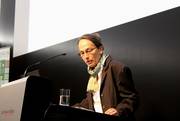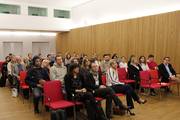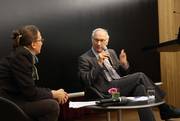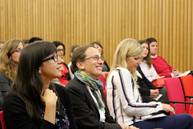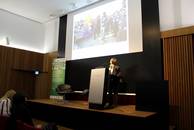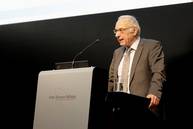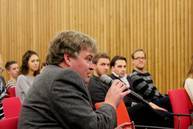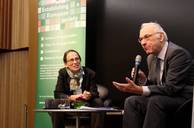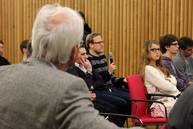

Dr Céline Belot
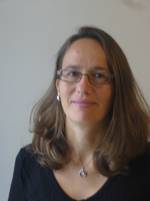 |
Dr Céline Belot is a full-time researcher at the CNRS (French National Council for Research) and has taught at Sciences-Po Grenoble since 2003. Previously, she was a lecturer at Geneva University and a junior research fellow at Amsterdam University (UVA). Her research is mainly focused on EU legitimacy and citizens’ attitudes towards European integration. She has recently started new research on public opinion and foreign policy. She is co-editor of the peer-reviewed journal Politique européenne.
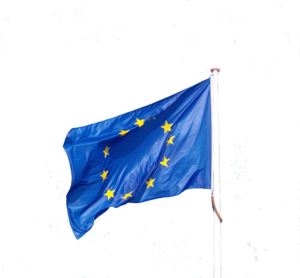 |
Course: 'From Europhiles to Eurosceptic citizens: Exploring the EU legitimacy crisis'
Dr Céline Belot held the THESEUS visiting professorship of the Winter Term 2014/15 at the University of Cologne. In her class "From Europhiles to Eurosceptic citizens: Exploring the EU legitimacy crisis" the French scientist and tutor at Sciences Po Grenoble explored the characteristics and origins of Euroscepticism. "I think the course was useful in the sense that we acquired a more nuanced picture of Euroscepticism and understood that it very much differs from member state to member state", said course participant Bodil Skousen, Master student from Denmark. Participant Peter Drahn, PhD Student of the University of Cologne, was surprised that the different forms of Euroscepticism have existed since the founding of the European Community.
Why have we observed a shift of a period of permissive consensus, a kind of indifference towards EU-politics, to a situation of growing Euroscepticism since the beginning of the 1990s? What influence did media and political actors have on this development? Why do differences exist between citizens’ attitudes of the EU across EU member states? These are some of the questions that Céline Belot’s seminar addressed. It was organized as block seminar with two sessions per week and six dates in total. "This allowed us to deal with the issue at hand in depth", said Peter. "On the second day of the two-day block we were familiar with the topic and were able to have informed debates."
The PhD student liked the methodological approach of the seminar. "Much of the theories and data used in the class will help me to better assess European politics in everyday life", said Peter. "The insights about research methods will probably help me a little with my PhD thesis." Bodil Skousen said: "I find it important to know various theoretical models to address the question of Euroscepticism. It it is important to deal with this phenomena to ensure EU legitimacy."
Prior to the start of her seminar in October 2014, we have talked with Mrs Belot about her motivation for the course and her expectations of the exchange with the students.
Inaugural Lecture: 'The emergence of the EU as a political issue: cause for despair or source of hope for European integration?'
On 27 October, THESEUS Visiting Professor Dr Céline Belot held her inaugural lecture 'The emergence of the EU as a political issue: cause for despair or source of hope for European integration' at the Fritz Thyssen Foundation in Cologne. It was introduced by the welcoming words of Dr. Thomas Suermann, Fritz Thyssen Stiftung Köln, Mirja Schröder, Programme Director of THESEUS, and Prof. Wolfgang Wessels, Jean Monnet Chair holder at the University of Cologne.
The French researcher from Sciences Po Grenoble divided her insightful speech into two parts. In its first part, she depicted the term politization and explained its development within the EU context. She analysed what EU citizens think of it and differentiated between two types of people: Those, who consider it to be a good thing and those, who are sceptical about it. In the second part of her speech, Belot applied her sayings to the French case. For that, she gave her audience, mainly consisting of political science students as well as researchers and experts in the field of European studies, insights into one of her recent studies. In this research, Belot had analysed the French presidential elections in 2012 in terms of candidates’ arguments, the role of EU issues and citizens’ attitudes regarding both candidates and issues. She had found that nowadays political parties have to position themselves on EU issues to gain voters support – a finding that she considers to be a general shift in EU politics. In 2012 French presidential elections, citizens who feared European integration voted for the EU-sceptic Marine le Pen. People who worried that EU politics might erode social policies voted for the left. A general finding of the French researcher was that the reference to France was particularly strong and more widespread than in presidential elections in 2007.
Belot presented the Danish case as an example for the fact that we cannot speak of a general shift towards a negative view on EU politization, but of citizens' ambivalent opinions about it. Denmark was a country, in which the politization of EU issues belonged to the day to day functioning of the political system and a country, in which the EU was positively evaluated by citizens. Belot ended her speech with a forward-looking appeal, optimistic without neglecting challenges in the process of European integration. ‘Rome was not built in a day, Bruxelles neither', closed the French researcher.
Following her speech, together with Prof. Wolfgang Wessels, Belot entered into a lively discussion with her audience. Listeners raised further questions concerning Belot’s studies and shared their own experiences on views on politization within the EU. The debate was a fruitful exchange of thoughts on topics such as people’s fears on the EU’s influence on national social welfare programmes or the fading voters’ support for central parties. The inspirating evening event was closed by a reception, in which participants could enter into follow-up talks.
